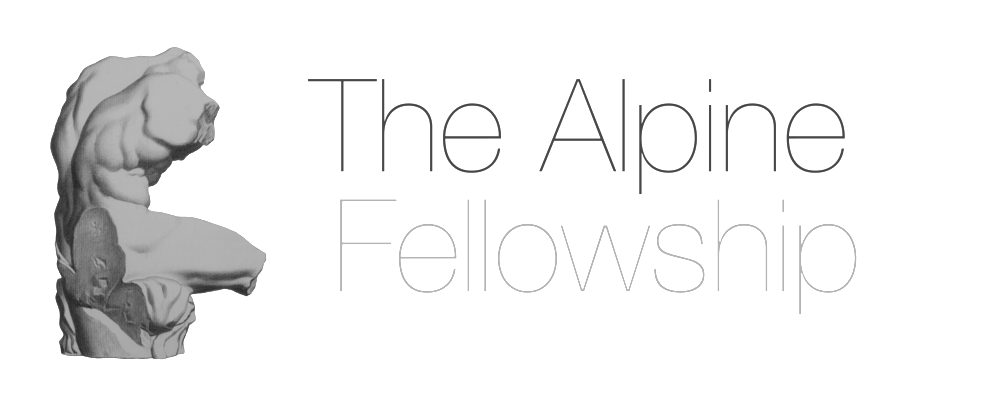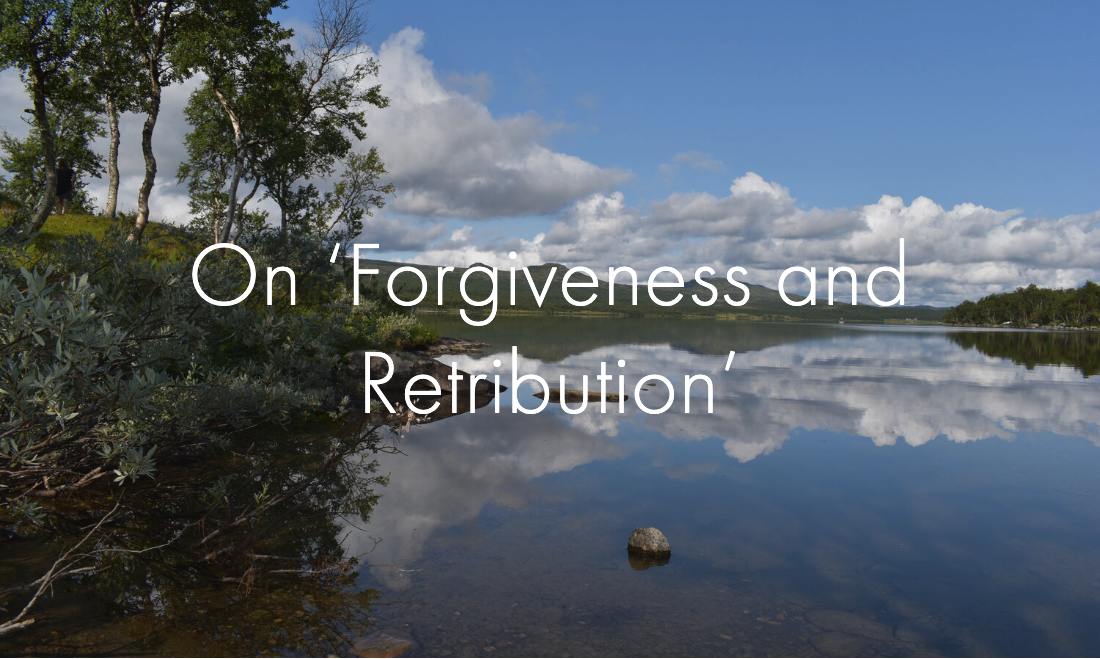Winter
Welcome to the first entry in the Alpine Fellowship Journal.
This is our chance to tell you everything that is happening, has happened and will be happening at the Alpine Fellowship.
First of all, we’ve recently made a lot of announcements about the Alpine Fellowship 2020, including the theme, location and a brand new prize. Submissions are now open and we’re already receiving lots of outstanding work from talented emerging artists, writers and academics.
But first we must begin with some sad news…
Sir Roger Scruton
1944-2020
By Jacob Burda
Roger meant everything to us at the Fellowship. He came right at the beginning when there was not yet a beautiful venue, extraordinary dinners or exciting guest lists. Roger came because he let himself be moved by intuition and feeling. That’s who he was, and in that way he differed from almost everyone else in the intellectual establishment.
Roger meant everything to me as a young philosopher. Once, in the first years of our knowing each other, I visited him on his beautiful farm in the English countryside. I will never forget his showing me his barn filled with more books than I had ever seen. In the middle of it all, sitting on top of a magnificent piano, there were scores of great German classical music. We went for long walks and read T.S. Elliot’s Four Quartets in front of the fire. The kindness with which he received me reassured me that philosophy could be a path not only of the mind but also of the heart, and that it was a path worth following. He inducted me into a possibility for what philosophy could be and has been throughout history in its finest moments - thought rooted in deeply lived human experience.
Roger’s life was a confluence of music, of poetry, of philosophy and literature. Of the modern project as ‘a continuation of religion through aesthetic means’. He can never be replaced. While he leaves behind a gaping hole in our hearts, we feel as committed as we ever have to continuing the work of the Alpine Fellowship. Doing so is our own way to honour Roger’s spirit.
By Alan Lawson
Like so many others I first knew Roger through his work. When I wrote to him, some ten years ago, with questions about kitsch he immediately responded and arranged to meet in London. That was the kind of man he was, happy to give up his time to instruct an ardent but ignorant young artist on the finer details of aesthetics.
It was a compelling experience to meet someone so learned and yet so generous with their time and knowledge. I felt entirely undeserving, yet Roger seemed to delight in welcoming people into his world of profoundly thoughtful conversations, and gentle pleasures. I remember him patiently walking me through a German opera over a bottle of port, explaining the needs of horses and of fields at his farm in Wiltshire, whipping up an omelette at Albany, or addressing the Alpine Fellowship with such wit and erudition that we talked about it for weeks.
Roger was often, unfairly, abused for his opinions. He was caricatured as all sorts of things, but those that spent any time with him always came away with the same impression: a kind man, a gentle soul, a wise and thoughtful scholar that had a great sense of the features that are worth preserving in our society.
He was everything to the Alpine Fellowship, without him we would certainly not be where we are today. We will truly miss him. I will truly miss him. We send our profound thoughts to Sophie, Lucy, and Sam, and hope that some of his legacy can live on in our work.
Sir Roger Scruton: The point of intersection of the timeless with time
Theme for 2020
Every year we pick a theme that we think will encourage discussion, debate and thought. For 2020, we’ve selected Forgiveness and Retribution, a pertinent theme for our times. We’ve already written a little bit about why we chose this theme, but if you’re interested in knowing more, here our founders explain why they chose this theme at this time.
Alan Lawson
The theme of forgiveness came directly out of last years symposium. The theme was Identity and in one particular panel, the discussion had moved on to the subject of power. Forgiveness is I suppose in some sense a relinquishing? When we ‘turn the other cheek’ do we effectively abandon the power game?
The roots of much of this in the western tradition is, in my opinion, Christianity. Regardless of what has been done in the name of a religion there still stand elements of profound importance, beauty, and meaning. At the Alpine we want to allow a space for a diverse range of voices, and a sense that it’s ok to talk about difficult subjects, so long as it is done with respect and kindness.
It may be easier to ask where does forgiveness rest in modern culture, and how important is it? Historically, not all cultures have embraced forgiveness, so we shouldn’t assume its position in the modern psyche or that it deserves one.
Thus we’re gathering to talk about forgiveness and retribution, and I suppose I might privately hope that we can find a strong argument for more of the former in our culture.
Jacob Burda
In this day and age what feels really important to us is to find themes that elicit hope. Hope for greater connection between each other, hope for more kindness towards ourselves. It’s our instinct that forgiveness is such a theme, and we are really curious about finding out to what extent that’s true.
Personally, practicing forgiveness has been something that has played a large role in my life this past year. It feels so important for opening the heart.
Unfortunately human beings frequently choose to cause pain rather than to feel it. This can be at the heart of retribution. But there may of course also be cases where certain forms of retribution are appropriate, indeed necessary. What distinguishes one from the other is something that I feel is really worth exploring.
New for 2020: The Alpine Fellowship Academic Writing Prize
In order to provide more support for even more emerging writers and thinkers, this year we’re proudly starting the Alpine Fellowship Academic Prize. This is for students, academics, thinkers, and anyone who identifies themselves as working in or interested in scholarship.
The judges will include Reader in Philosophy at Birkbeck University, Andrew Huddleston.
In order to answer any questions you might have, we sat down with Andrew to ask him what the new prize is all about and what advice he would give to anyone thinking of applying.
What is the aim of the new prize?
The aim of the new prize is to encourage high-quality writing on the topic (this year, forgiveness and retribution). We want to reward work that combines being informative and illuminating with having a good prose style. We put a particular premium as well on the piece's being accessible to a general audience.
Who is eligible to enter?
Although this is described as an academic writing prize, one does not need to be a university academic in order to submit. It is instead about the style of writing, in contrast to fiction-writing, autobiographical narrative, poetry, etc. The sort of work we are looking for will either develop an argument, or expound a point discursively in a way that makes a contribution to our knowledge of the topic.
What advice would you give for those thinking about entering?
It's crucial to speak closely to the themes of the fellowship: forgiveness and retribution; contributions that are only tangentially related or off-topic will not make it far. It's also crucial to write in an engaging, approachable way. 'Academic writing' does not mean jargon-clotted, boring prose. One wants to write in a way that will interest a general intellectual audience and get them thinking about this topic.
2019 Winners
Finally, as we look ahead to 2020, we wanted to say another congratulations to all of our 2019 prize winners - most of whom are pictured above at our 2019 Symposium in Fjällnäs, Sweden. They have set the bar extraordinarily high for this year, but there is such an incredible amount of talent emerging in all of the disciplines we support, we have no doubt that it will be cleared.
If you’re out there and thinking of applying, but are not sure if this is for you, let us say right now, it is. The Alpine Fellowship is for everyone. No matter where you come from, what your education is or what your experience is, you’re in with a chance. So get to work and we will look forward to seeing what you come up with.
The Alpine Fellowship






